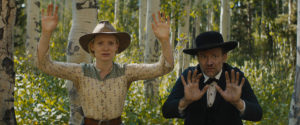
“I hope you’re not looking to be saved, because you’re going about it the wrong way!” Spewed by a town drunkard in David and Nathan Zellner’s new film “Damsel,” this warning could not have been more prescient. “Damsel” demolishes the mythic status of the American West as a land of salvation, an expectation forged in early film history. Playing like a hairbrained, Sartrean take on “The Searchers,” the film takes an ambitious dive into despair and detachment — with a garnish of gallows humor.
The film takes place as the Wild West begins to lose its veneer as the triumph of manifest destiny. Nothing remains but soulless, empty towns and canyons, sparsely populated by a motley crew of morally bankrupt misfits. Samuel Alabaster (Robert Pattinson), a charming, upright young man, rides into town on a journey, his miniature horse Butterscotch in tow. He is on his way to meet his fiancee Penelope (Mia Wasikowska), who lives outside town. On his way, Samuel meets Parson Henry (David Zellner), an alcoholic preacher, and recruits him to accompany Samuel and officiate his wedding. Along the way, the two are attacked by Rufus Cornell (Nathan Zellner), from whom Samuel manages to escape. Here, Samuel reveals that Penelope was kidnapped by Rufus’ brother Anton (Gabe Casdorph) and that he and Parson must save her. However, when everyone reunites, the tides turn in the most spectacular of ways — Penelope is no damsel in distress, and Samuel is forced to explain himself.
As a writing and directing pair, the Zellners are masters of tone and the reveal, even if they could use some restraint in the scope of their vision. From the opening scene, which follows a bus stop conversation in the middle of a canyon, an absurdist tone is firmly established. Think “Waiting for Godot,” but with stagecoaches. Throughout the film, the Zellners carefully stagger reveals — both narrative and cinematographic — with absolute precision. These keep the film, which is nearly 30 minutes too long, moving in fits and starts until the end, settling into a pace that whisks along like a tumbleweed. Even their camera leaves crucial information out of the frame, panning and zooming out to reveal crucial visual points with a bang. Adam Stone’s cinematography is gorgeous, framing these reveals with effortless mastery. The Zellners also recruited electronic band The Octopus Project to score the film. Their music carries the film perfectly, moving at a fever pitch that is alternately zany and menacing.
Both Zellners appear onscreen here — Nathan has a minor role, but David Zellner’s Parson is in the majority of the runtime. David Zellner’s performance is the weakest in the film, with awkward delivery that results in a malformed character. Alternately, Pattinson has become one of our generation’s most talented and fascinating screen performers in his post-“Twilight” years, bringing Hollywood star power to indie auteurs among the likes of David Cronenberg, James Gray and the Safdie Brothers. He’s an absolute goofball here, grinning through a gold tooth and giving an uncomfortably gonzo performance. But Wasikowska steals the film as Penelope, a strong-willed, realist beacon among a valley of comically dimwitted, horny men who get in her way.
Central to her character is the film’s play on gender, which is by far its greatest asset. Penelope, the “damsel” of the film’s ironic title, couldn’t be a worse fit for this epithet. She takes control of every situation she’s in, and her trouble is nothing more than myth. Samuel, conversely, is the self-described “nice guy” with sinister intentions, employing emotional manipulation and abuse because he believes a woman owes him love. He becomes the film’s most villainous character by attempting to control her story through his own perspective. When she rightfully lashes back, all hell breaks loose. It’s a candid commentary on an all-too-prevalent behavior among controlling young men and the very notion of the damsel in distress in many film genres — chief among them the Western.
Overall, “Damsel” manages to take the mythic imagery of the West — figures in a landscape, characters leaving on horseback — and turn them into a grotesquely artificial realm, rather than a spiritual one. Still, there’s a strong presence of salvation and its pointlessness. Baptismal imagery pervades the first act, with Samuel arriving by boat and washing the drunken Parson in the coastline. In this West, everyone is looking for some connection, some opportunity to change themselves (or someone else), yet are met with nothing but loneliness and existential anxiety. The land swallows them whole and finding a new life is nothing more than peeing in the wind. It’s the American Dream as absurdist nightmare. The Zellners scream this point from a cliff — the film’s ideas are often presented as too on the nose to land with any power.
One case where this does work, however, is toward the end of the film. In this scene, Parson is having a fireside chat with Native American Chief Running Bear (Joe Billingiere). Parson gives a desperate, impassioned speech in which he begs Running Bear to take him in and show him the ways of indigenous culture. Running Bear responds simply: “What is wrong with you?” The Zellners bring not only the myth of the West, but also the bizarre desires of their characters to their knees here in the film’s only skirmish with the privilege of whiteness. It’s an amazing scene that leaves more to be desired from the film as a whole. Overall, the audience is left with an undoubtedly unusual and, frankly, fun experience of genre deconstruction, one with a lot on its mind and an absence of heart.
Grade: B
The post In ‘Damsel,’ the West is No Country for Thirsty Men appeared first on The Emory Wheel.

